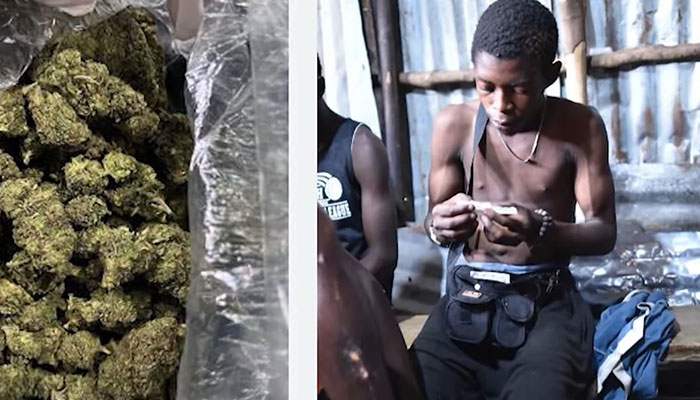Sierra Leone declared a national emergency over a psychoactive drug called “kush,” which reportedly includes ground human bones among its other toxic ingredients.
The country’s president, Julius Maada Bio, addressed the nation on April 4 and declared a national emergency on substance abuse in Sierra Leone. He called the drug a “death trap” that has caused hundreds of deaths and caused psychiatric damage to a large number of users.
“Our country is currently faced with an existential threat due to the ravaging impact of drugs and substance abuse, particularly the devastating synthetic drug kush,” the president said.
He said there had been “escalating fatalities” among users of the highly addictive substance, dubbed the “zombie” drug for the hypnotic effect it has on its users.
The drug known as kush is also called the “zombie” drug for the kind of effect it has on users

Kush first emerged in the West African country about six years ago and eventually led to a haunting epidemic. In recent times, Sierra Leone saw an alarming rate of youngsters growing addicted to the hit from kush — a synthetic, cannabinoid-like drug that triggers a hypnotic high that lasts for several hours.
Youngsters who smoke kush have revealed how grave their addiction has become after the hypnotic drug entered their lives.
“When I smoke kush, I forget my problems. It usually takes me to ecstasy,” Amara Kallon, a 21-year-old school dropout, told The Telegraph.
“I used to smoke a couple of slings of marijuana a day but after I was introduced to kush by friends, I never turned back. I sold my clothes and books to satisfy my addiction. I started stealing house-hold items, phones, pots and dishes to buy drugs,” he added.
Amara, who is unemployed, said kush allows him to “escape the harsh realities of life.”
“I love it,” he added. “It makes me feel happy for a moment, enough to forget my worries and societal problems.”
Many unemployed youngsters have admitted the drug allows them to forget the harsh realities of life

Salifu Kamara, another 21-year-old kush user, echoed similar sentiments about the drug allowing him to forget his problems.
“It makes you forget,” Salifu told NPR. “We’re under such strain. There’s no work. There’s nothing here.”
Salifu, who once aspired to become an electrician, admitted he now spends all his meager earnings from carrying loads for merchants on buying kush.
“Before, if we had money we’d spend it on food or clothes,” he said. “Now we just buy kush. It makes you want to cry, but it’s not easy to stop.”
The drug is composed of many ingredients, some of which reportedly include opioids, cannabis, disinfectants, and ground-up human bones. The strange mix of ingredients prompted locals to rush to cemeteries and dig up graves for human skeletons in recent times. Officials have now taken measures to tighten the security surrounding cemeteries to stop the trend.
Grounded human bones are reportedly one of the toxic ingredients used to make kush

A National Task Force on Drugs and Substance Abuse has also been set up in the country with the objective of “combating the kush crisis” in Sierra Leone.
“There is a lot the authorities must do beyond the president’s address last night to combat this scourge,” Marie, a mother who lost her 21-year-old son to kush, told BBC.
Although there are no official figures on the number of deaths caused by kush, the country’s capital of Freetown saw hundreds of young men dying from organ failure due to the drug in “recent months,” a doctor told the outlet.
Moreover, the number of patients admitted to the Sierra Leone Psychiatric Hospital in the country surged by about 4,000% between 2020 and 2023.
The prolonged use of kush also leads to users complaining of severe swelling. Their immune systems grow weak over time as a result of the drug, leading to sores, infections, and swelling in the legs and feet.
Kush addicts often find their legs swollen, and they also develop infections due to their weakened immune system

Dr Jusu Mattia, acting medical superintendent at the Sierra Leone Psychiatric Teaching Hospital in Freetown, said the number of referrals of kush addicts has been increasing on a daily basis.
“We have already recorded nearly 2,000 cases of kush addicts in 2023 at the hospital. Many are dying in homes and on the streets,” Jusu told the outlet.
“The kush drug crisis is everywhere, but only a few are referred and most of those treated end up relapsing,” he added.
According to The Telegraph, the center recorded 47 people as kush users in 2020. The number then increased to 1,101 in 2022, and most of the patients are males between the ages of 18 and 25.
“Kush is a very dangerous drug like heroin or cocaine, it’s strong, cheap and easily available, there is weak regulation and control over the sale of the drug and it’s becoming widespread in West Africa,” Dr. Edward Nahim, a consultant psychiatrist at the Sierra Leone Psychiatric Teaching Hospital, told the outlet
“The lack of jobs and opportunities is a driving force leading many youths into drug addiction after the disruption of economies by the Covid pandemic,” Edward added.
Some social media users agreed that the country’s officials must take measures to combat the alarming crisis












